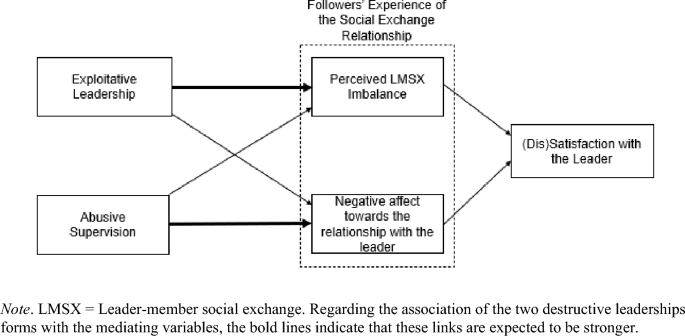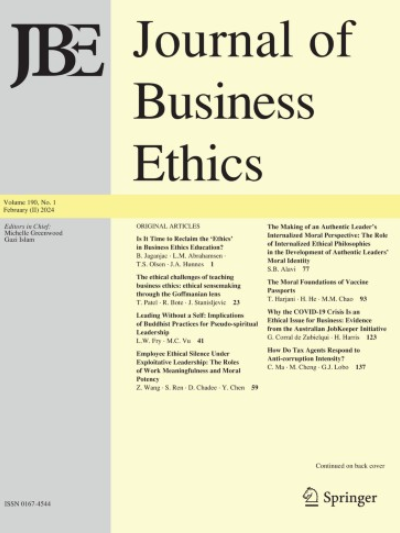Felt or Thought: Distinct Mechanisms Underlying Exploitative Leadership and Abusive Supervision
IF 5.9
1区 哲学
Q1 BUSINESS
引用次数: 0
Abstract
Abstract The last two decades have seen a mounting fascination with unethical and destructive forms of leadership. Yet, do we know what all encapsulates this “dark” side of leadership? Despite initial evidence that exploitation is a notable addition to the unethical leadership scene, our understanding of its distinctiveness as well as of how and why it exerts its negative effects is limited. We speak to this gap by testing the distinct mechanisms through which exploitative leadership—relative to the more popular counterpart, abusive supervision—affects followers. Borrowing from the aggression literature, we describe exploitative leadership and abusive supervision as varying forms of aggression that undermine followers’ satisfaction with the leader via altered experiences of their social exchange relationship. Our theoretical model proposes that abusive supervision, as an inherently interpersonal provocation, primarily implicates followers’ emotional experiences within the social exchange process. By contrast, given its inherent focus on self-interest, exploitative leadership is assumed to affect followers primarily through the cognitive understanding of the social exchange. Results from multiple studies using different samples, measures, and research designs provide general support for our predictions. In sum, the evidence emerging from our data shows that exploitative leadership is not a symptom of construct proliferation but rather, adds cumulative knowledge to the field of unethical and destructive leadership.

感觉或思考:剥削性领导和滥用性监督背后的独特机制
过去二十年来,人们对不道德和破坏性的领导形式越来越着迷。然而,我们知道领导力的“阴暗面”是什么吗?尽管最初的证据表明,剥削是不道德领导场景中一个显著的补充,但我们对其独特性以及它如何以及为什么产生负面影响的理解是有限的。我们通过测试剥削性领导(相对于更受欢迎的对应物,滥用监督)影响追随者的不同机制来解决这一差距。借用侵略文献,我们将剥削性领导和虐待性监督描述为不同形式的侵略,通过改变其社会交换关系的经历来破坏追随者对领导者的满意度。我们的理论模型认为,虐待性监督作为一种内在的人际挑衅,主要是在社会交换过程中影响追随者的情感体验。相比之下,由于其固有的对自身利益的关注,剥削性领导被认为主要通过对社会交换的认知理解来影响追随者。使用不同样本、测量方法和研究设计的多项研究结果为我们的预测提供了总体支持。总之,从我们的数据中出现的证据表明,剥削性领导不是结构扩散的症状,而是为不道德和破坏性领导领域增加了累积的知识。
本文章由计算机程序翻译,如有差异,请以英文原文为准。
求助全文
约1分钟内获得全文
求助全文
来源期刊

Journal of Business Ethics
Multiple-
CiteScore
12.80
自引率
9.80%
发文量
265
期刊介绍:
The Journal of Business Ethics publishes only original articles from a wide variety of methodological and disciplinary perspectives concerning ethical issues related to business that bring something new or unique to the discourse in their field. Since its initiation in 1980, the editors have encouraged the broadest possible scope. The term `business'' is understood in a wide sense to include all systems involved in the exchange of goods and services, while `ethics'' is circumscribed as all human action aimed at securing a good life. Systems of production, consumption, marketing, advertising, social and economic accounting, labour relations, public relations and organisational behaviour are analysed from a moral viewpoint. The style and level of dialogue involve all who are interested in business ethics - the business community, universities, government agencies and consumer groups. Speculative philosophy as well as reports of empirical research are welcomed. In order to promote a dialogue between the various interested groups as much as possible, papers are presented in a style relatively free of specialist jargon.
 求助内容:
求助内容: 应助结果提醒方式:
应助结果提醒方式:


